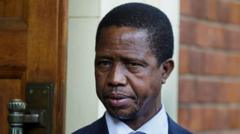Pope Francis' funeral will occur on Saturday at St. Peter's Basilica, embracing a modest approach that encapsulated his papacy. Nations observe periods of mourning, with global leaders paying respects, as discussions on his successor begin.
Pope Francis Funeral Set for Saturday as Global Tributes Flow

Pope Francis Funeral Set for Saturday as Global Tributes Flow
The Vatican announces a simpler funeral for Pope Francis, reflecting his wish for modesty, amidst worldwide mourning and tributes from leaders.
April 22, 2025, 6:45 a.m. ET
Pope Francis’ funeral is scheduled for Saturday at 10 a.m. in St. Peter’s Basilica, reflecting the pontiff’s lifelong dedication to simplicity. Having passed away at 88 years old, the pope’s final wishes for a modest funeral will be honored, foregoing traditional ornate rituals in favor of a more streamlined ceremony. Although the planned funeral will maintain its significance, it will mark a departure from the usual grandiosity associated with such events.
In the immediate aftermath of his passing, Cardinals from around the globe convened at the Vatican, initiating the delicate process of selecting a new pope. Francis' body will be transferred for public viewing on Wednesday, allowing the faithful to pay their last respects before burial, which typically occurs within four to six days posthumously.
Political and religious dignitaries are expected to attend, although the geopolitical landscape has shifted dramatically since Francis' papacy began in 2013. Leaders who once shared his compassionate vision for the marginalized are now overshadowed by a wave of conservatism, raising questions about the direction of the Catholic Church moving forward. This evolution also offers conservative factions within the church an opportunity to influence future policies and principles.
Amid these changes, global tributes have poured in, with numerous countries declaring official periods of mourning. Nations such as Australia, Italy, and Brazil have lowered flags to half-staff, representing a unified tribute to the spiritual leader celebrated for championing the causes of migrants and vulnerable communities.
In Caracas, Venezuela, the local cathedral was filled with mourners at a memorial service, highlighting the deep connection many felt toward Francis, especially in regions he impacted profoundly. Priests and parishioners emphasized the warmth and inclusivity that characterized his papacy, urging followers to remember the legacy of empathy and accessibility he instilled in the church.
Across the world, Masses held in his honor echoed these sentiments, as communities gathered to share collective grief. Notably, discussions about the next pope's potential candidates are already commencing, indicating the significant task ahead as the College of Cardinals prepares to navigate their choice. As nations reflect on the impact of this singular pope, the future trajectory of the Catholic Church now rests in the hands of those poised to step into the role he so compassionately embodied.
Pope Francis’ funeral is scheduled for Saturday at 10 a.m. in St. Peter’s Basilica, reflecting the pontiff’s lifelong dedication to simplicity. Having passed away at 88 years old, the pope’s final wishes for a modest funeral will be honored, foregoing traditional ornate rituals in favor of a more streamlined ceremony. Although the planned funeral will maintain its significance, it will mark a departure from the usual grandiosity associated with such events.
In the immediate aftermath of his passing, Cardinals from around the globe convened at the Vatican, initiating the delicate process of selecting a new pope. Francis' body will be transferred for public viewing on Wednesday, allowing the faithful to pay their last respects before burial, which typically occurs within four to six days posthumously.
Political and religious dignitaries are expected to attend, although the geopolitical landscape has shifted dramatically since Francis' papacy began in 2013. Leaders who once shared his compassionate vision for the marginalized are now overshadowed by a wave of conservatism, raising questions about the direction of the Catholic Church moving forward. This evolution also offers conservative factions within the church an opportunity to influence future policies and principles.
Amid these changes, global tributes have poured in, with numerous countries declaring official periods of mourning. Nations such as Australia, Italy, and Brazil have lowered flags to half-staff, representing a unified tribute to the spiritual leader celebrated for championing the causes of migrants and vulnerable communities.
In Caracas, Venezuela, the local cathedral was filled with mourners at a memorial service, highlighting the deep connection many felt toward Francis, especially in regions he impacted profoundly. Priests and parishioners emphasized the warmth and inclusivity that characterized his papacy, urging followers to remember the legacy of empathy and accessibility he instilled in the church.
Across the world, Masses held in his honor echoed these sentiments, as communities gathered to share collective grief. Notably, discussions about the next pope's potential candidates are already commencing, indicating the significant task ahead as the College of Cardinals prepares to navigate their choice. As nations reflect on the impact of this singular pope, the future trajectory of the Catholic Church now rests in the hands of those poised to step into the role he so compassionately embodied.















